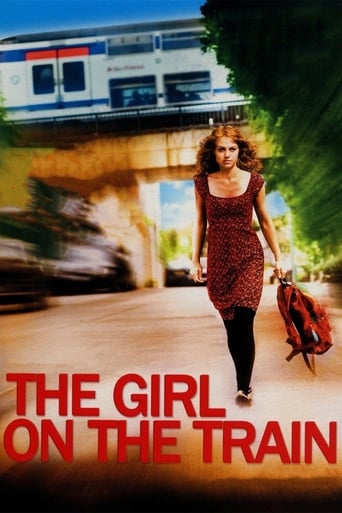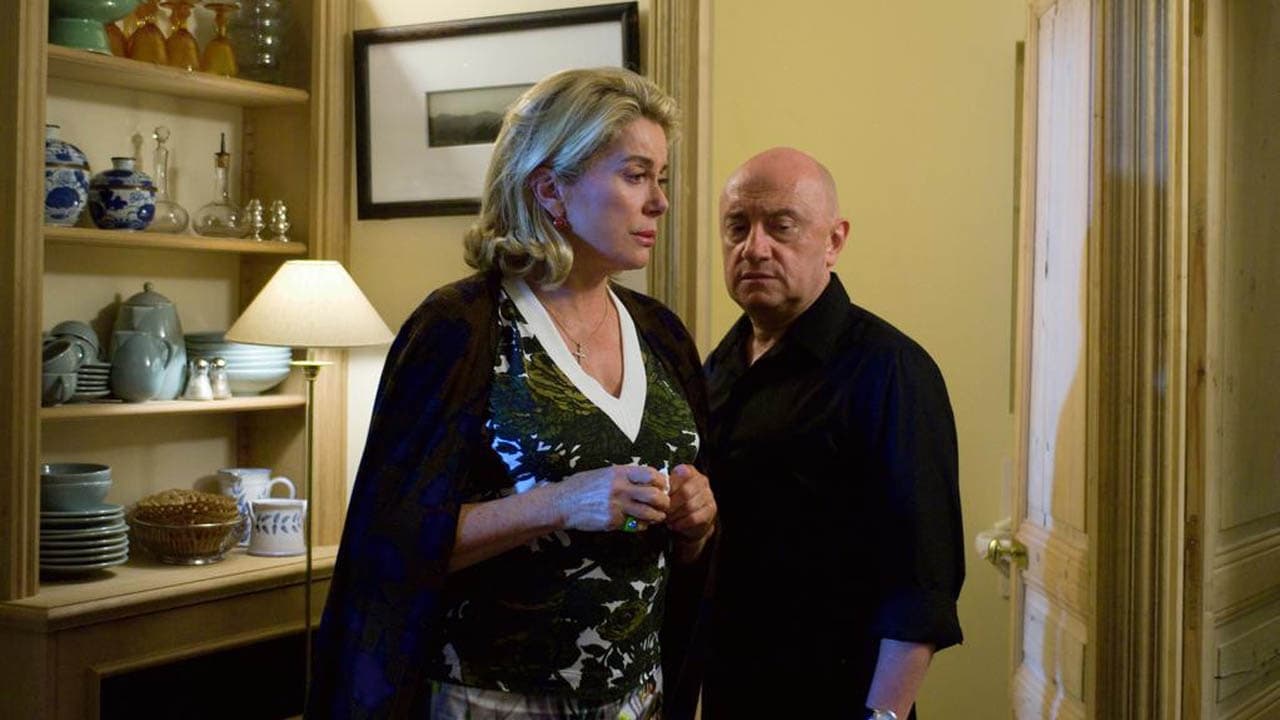SnoopyStyle
Jeanne (Émilie Dequenne) is a beautiful roller blading girl. Her mother Louise (Catherine Deneuve) was an ex to prominent Jewish crusading lawyer Samuel Bleistein. Jeanne fails to get a job with him. She starts dating sketchy Franck. He's arrested and then he rejects her. She's heartbroken and fakes an attack by neo-Nazis on a train even cutting herself.She's an enigma wrapped in a mystery performed by a blank actress. I don't feel like the movie explain anything about her. Dequenne is a beautiful girl but I don't get a sense of her character. In many ways, she is the least interesting character in the movie. As for the story, it's not terribly intense or dramatic. The danger for her is so low. This is supposedly inspired by true events. It does make me wonder about the real story. This could have been a great exciting character study.
gradyharp
André Téchiné's 'The Girl on the Train' (La fille du RER) focuses on a naive girl Jeanne (Émilie Dequenne) who fabricates a story about being attacked on a suburban Paris train by black and Arab youths who supposedly mistook her for a Jew. The story is based on a real event that took place in France in 2004, adapted for the stage by Jean-Marie Besset as 'RER', and written for the screen by Besset, Odile Barski, and director Téchiné. Téchiné, stating that 'the story became the mirror of all French fears, a revelation of what we call the 'collective unconscious.' How an individual's lie is transformed into truth with respect to the community at large and its fears', 'The Girl on the Train' dissects the psychological circumstances and consequences surrounding a bold lie in a rich drama, concentrating on the permutations such an act has one all concerned. Jeanne lives with her single mother Louise (Catherine Deneuve) who manages the family finances as a childcare provider. Jeanne spends the greater part of her time roller skating and it is on one of her excursions that she meets the rather mysterious Franck (Nicolas Duvauchelle), a young wrestler who immediately attempts to win Jeanne's attention and affection despite Jeanne's insecurities. They eventually respond to the mutual chemistry and Franck searches for a way to help Jeanne out of financial difficulties: they become caretakers in a warehouse home, which is unbeknownst to Jeanne, a drug trafficking site. An incident occurs when a 'buyer' shows up and Franck is stabbed in defending his caretaker job and Jeanne's future. Jeanne is distraught but when she visits Franck in the hospital, Franck blames Jeanne for his bad luck and rebuffs her - he must now serve prison time for his involvement in the drug game. Now, torn between her loss of money, her new 'home', and the love of Franck, Jeanne plans a manner of striking back: she slices her skin, clips her hair, and paints swastikas on her abdomen and reports that she has been attacked by anti-Semites. Louise seeks the assistance of an old flame who is now the important Jewish lawyer Samuel Bleistein (Michel Blanc) - man with whom Jeanne had unsuccessfully interviewed for a job - and what Louise thought would be a protection for both Franck and Jeanne results in Jeanne's confession that she fabricated the entire incident, a factor that disrupts the lives of all those affected by the lie, especially the family of Bleistein already teetering on disintegration due to the rocky marriage of his son and daughter-in-law and the preparation for the grandson's contested Bar Mitzvah. Téchiné knows how to take seemingly ordinary people and circumstances and show the profound effect of evil wherever it raises its head. The film is enhanced by the verismo photography by Julien Hirsch and the apropos musical score by Philippe Sarde. While this film is not quite up to the standards of Téchiné's films such as 'Wild reeds', 'My Favorite Season', 'Changing Times' or 'Strayed', it still maintains that realistic surface beneath which lies the real grit of life. In French with English subtitles. Grady Harp
asc85
First of all, I have to say that I am positive about this film. But I'm not sure why this film is being marketed as one about a young woman who says she was attacked by minorities that creates a media frenzy. Sure, that happens in the movie, but it's towards the end, and doesn't even seem to me to be the primary thrust of the picture. To me, the film is about the adventures of a screwed-up young woman (well-played by the very pretty Emilie Dequenne) who can't find a job, moves in with a potentially dangerous young wrestler, gets involved in drugs, and, oh by the way, gives self-inflicted wounds to herself and creates a major controversy.I guess one of the reasons I liked this movie was because it told a story that I wasn't sure where it was going, but I didn't mind because the story was an extremely interesting one, that cut and cross-cut to different sub-plots and characters.
sandover
André Téchiné's newest film The Girl on the Train is a combination topical expose and sophisticated melodrama. Using a real-life case where Alice (Emilie Dequenne), a girl from a banlieu outside Paris lied about being the victim of a bias attack, Téchiné takes the emotional pulse of hate crimes and finds symptoms of common psychological distress. In other words, it's a love story from the uniquely expansive—and inquiring—point of view that makes Téchiné France's most fascinating contemporary filmmaker.The first sight of Alice rollerskating through the streets, thick curly hair surrounding her stolid face, presents a "normal" Téchiné youth—complex, enigmatic, hypersensitive to the world. Alice's place in the universe, and her politically incorrect actions, recall the troubled boy in the 1987 Scene of the Crime where Téchiné evoked the template of Great Expectations to explore how one character's fortune linked to and revealed a larger, social view of destiny.Pondering Alice's emotional life when she falls in love with a young wrestler, Franck (Nicolas Duvauchelle), takes Techine beneath the surface stability of other characters. Alice's mother Louise (Catherine Deneuve) was a nonconformist now settled by maternity and unsettled by encountering an old acquaintance, Jewish activist Samuel Bleistein (Michel Blanc). Techine intermixes these histories and on-going fates; his quick, graceful pace, piercing insight and visual flair are perfectly symbolized in Alice's rollerskating sprees. One is constantly propelled and dazzled.Alice's heterosexual female story keeps Téchiné several leaps ahead of one's expectations—and especially the intellectualized gay-ghetto preoccupations of his sex-and-psychology protégé Jacques Nolot (Before I Forget, Porn Theatre).The contrasts between Alice and Louise, Bleistein and Franck vividly illustrate the common effort to achieve satisfaction and strength. For Téchiné, race, class and gender give access to understanding this constant struggle. His post-modern approach, through Dickens, Lean, even the Dardennes brothers (Dequennes is best known for their film Rosetta) remains unsentimental about obdurate human nature. And for those further intrigued by these mysteries of love and character and society—and their authenticity—an honorary soundtrack to the emotions Téchiné uncovers in The Girl on the Train can also be found in every track of Morrissey's Years of Refusal.


 AD
AD


